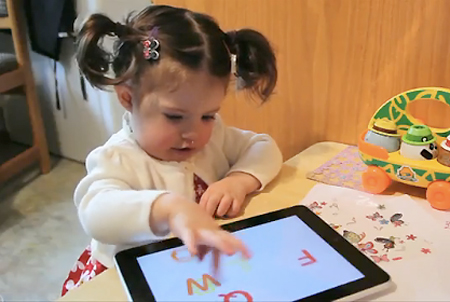Parenting by iPad; Godsend or iBribery?

An AP article from October 26, 2011 still has stuck in my head for a while because it raised an issue that I'm sensitive to: parenting by iPad.
Raising small kids (in my case, a four and a one year old) in a high-tech household means that it's only a matter of time before the little one discover the wonders of the iPhone or iPad -- then what do you do?
We've all seen it, the family at a restaurant, parents engaged in normal conversation while the kinds stare quietly at the screens of their iPads, touching, swiping and pinching the time away. Let's be very clear, you can replace the word "iPad" in the above sentence above with virtually any form of flat screen media (Gameboy, DS, PSP) -- it's not the media that's at issue, it's the underlying principle.
The AP article by Rasha Madkour Squirmy toddler? There's an app was syndicated to print newspapers across the U.S. and it profiled parents that use their iOS devices as "digital pacifiers" for their kids.
A Denver mom calls her iPhone a "godsend" for its ability to stream episodes of Dora the Explorer which placates her two year-old daughter. While discussing the routine she mentions that she "doesn't want people to think they're using technology to shut their child up, but she also doesn't want to give up going out."
A New Orleans mom says that her iPad "is movies, books and games all wrapped in one nice package," noting that it keeps her 3-year-old son "busy for hours." A Silicon Valley mom says that her 2 1/2-year-old loves conceptual apps, memory matching games and a drawing program but also notes that he has books, crayons and Legos. "It's not replacing any of these things; it's one more thing he's getting exposed to,"
The potential benefit of iPhones and iPads for young children is obvious, they're undeniably powerful learning tools -- but as Wake Forest University psychology professor Deborah Best notes in the article -- content must be age-appropriate and designed for learning. In other words, Angry Birds doesn't cut it.
She astutely says that interacting with devices doesn't replace one-on-one, face-to-face interaction with people, noting that personal interactions help children learn how to read emotions from facial expressions and how to take turns in conversations.
The article brings up the downside adolescent dependency on smartphones and tablets, including the inevitable tantrums and meltdowns when access is denied. One mother of 3- and 6-year-old sons mentioned in the article readily admits to iBribery: "I'm buying my kids' silence with an expensive toy."
When her in-laws get together for a family meal, six iPhones get passed to six children. The adults talk while the kids play, their contribution to the discussion typically limited to announcing they have cleared another level on a game.
Kids need to be social, and personal interactions are what helps them grow and mature. Most modern parents have probably handed their iPhone or iPad or a child to help ease a long car, train or airplane trip, but allowing them at the dinner table is where I draw the line. (Granted, our kids are really young, and my tune may change.)
We do everything in our power to limit our kids exposure to flat screen media -- including television -- but it's practically ubiquitous in modern America. The warm glow of flat panels displaying bright motion graphics are everywhere from store windows to gas pumps to checkout aisles.
A 2004 study by Children’s Hospital and Regional Medical Center in Seattle published in the April issue of Pediatrics concluded that each hour of television watched per day at ages 1-3 increases the risk of attention problems, such as ADHD, by almost 10 percent by age 7. At our house we try to adhere to the no-tv-under-two philosophy that many pediatricians recommend, but obviously there are exceptions.
We limit our four-year-old to a maximum of one hour on the iPad or iPhone (mostly in long car rides) and never in social situations where there will be other kids or parents. In other words, its ok to to use the iPad on the drive to gradma's house but not at gradma's house. We also encourage educational apps, but don't object to the occasional game of Angry Birds or Cut the Rope. (They teach kids physics, right?)
While there's definitely no one answer about how to parent with your iPad -- after all, every kid is different -- it's pretty obvious that young children shouldn't get exposed to too much flatscreen media until their brains are developed enough to handle it.
Where do you fall on the issue? Should young kids be using iPads?
Image: Zagg
